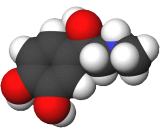Epinephrine (EPI)
Adrenaline

| SPN | V953 |
| Wiki | Epinephrine |
| CAS | 51-43-4 |
Epinephrine is a hormone and neurotransmitter. When produced in the body it increases heart rate, dilates blood vessels and air passages and participates in the "fight or flight" response of the sympathetic nervous system. It is a catecholamine, a sympathomimetic monoamine produced by the adrenal glands from the amino acids phenylalanine and tyrosine. Japanese chemist Jokichi Takamine and his assistant Keizo Uenaka independently discovered Adrenaline in 1900. In 1901 Takamine successfully isolated and purified the hormone from the adrenal glands of sheep and oxen. Adrenaline was first synthesized by Friedrich Stolz and Henry Drysdale Dakin, independently, in 1904. When in the bloodstream, it rapidly prepares the body for action in emergency situations. The hormone boosts the supply of oxygen and glucose to the brain and muscles, while suppressing other non-emergency bodily processes (digestion in particular).
